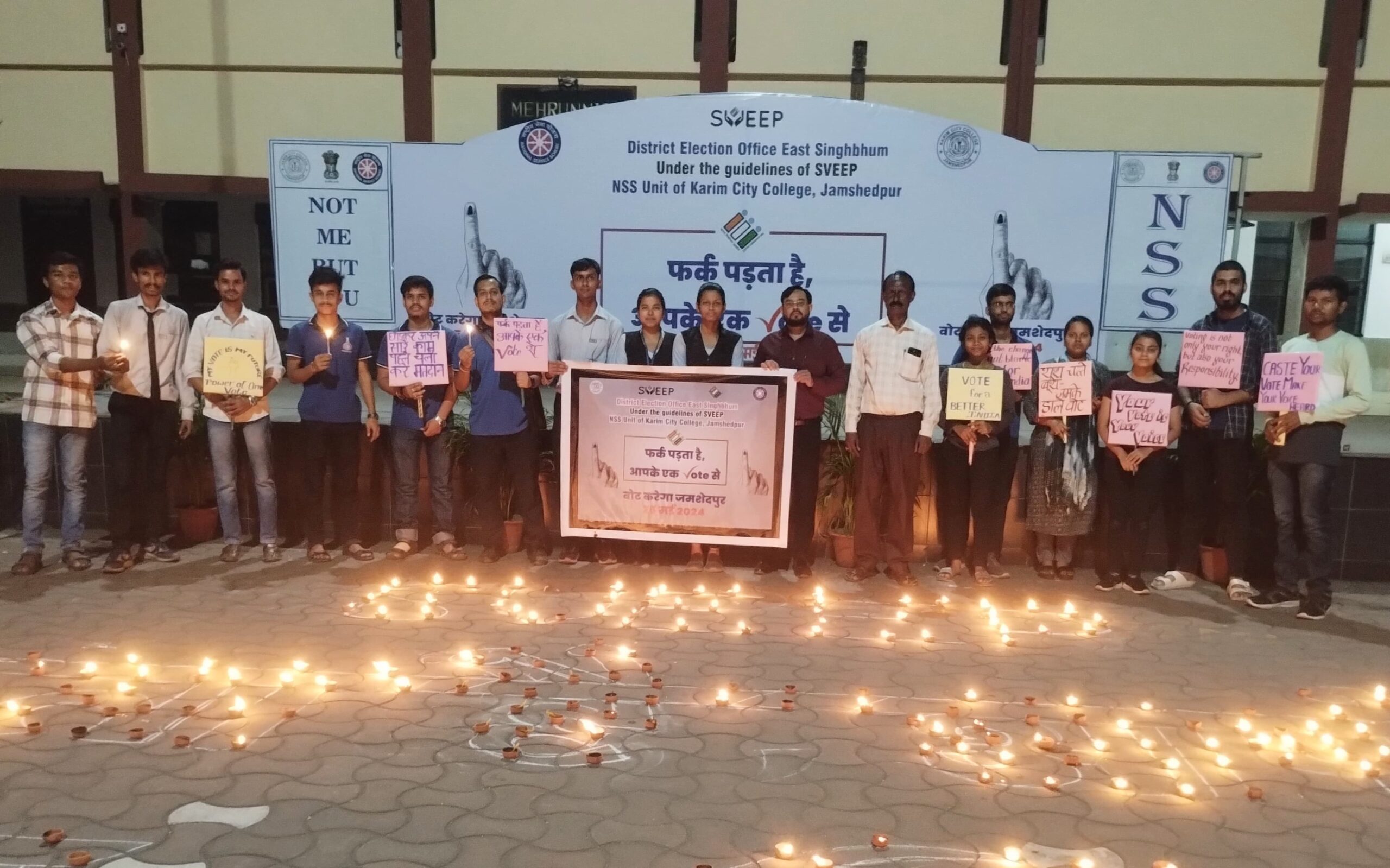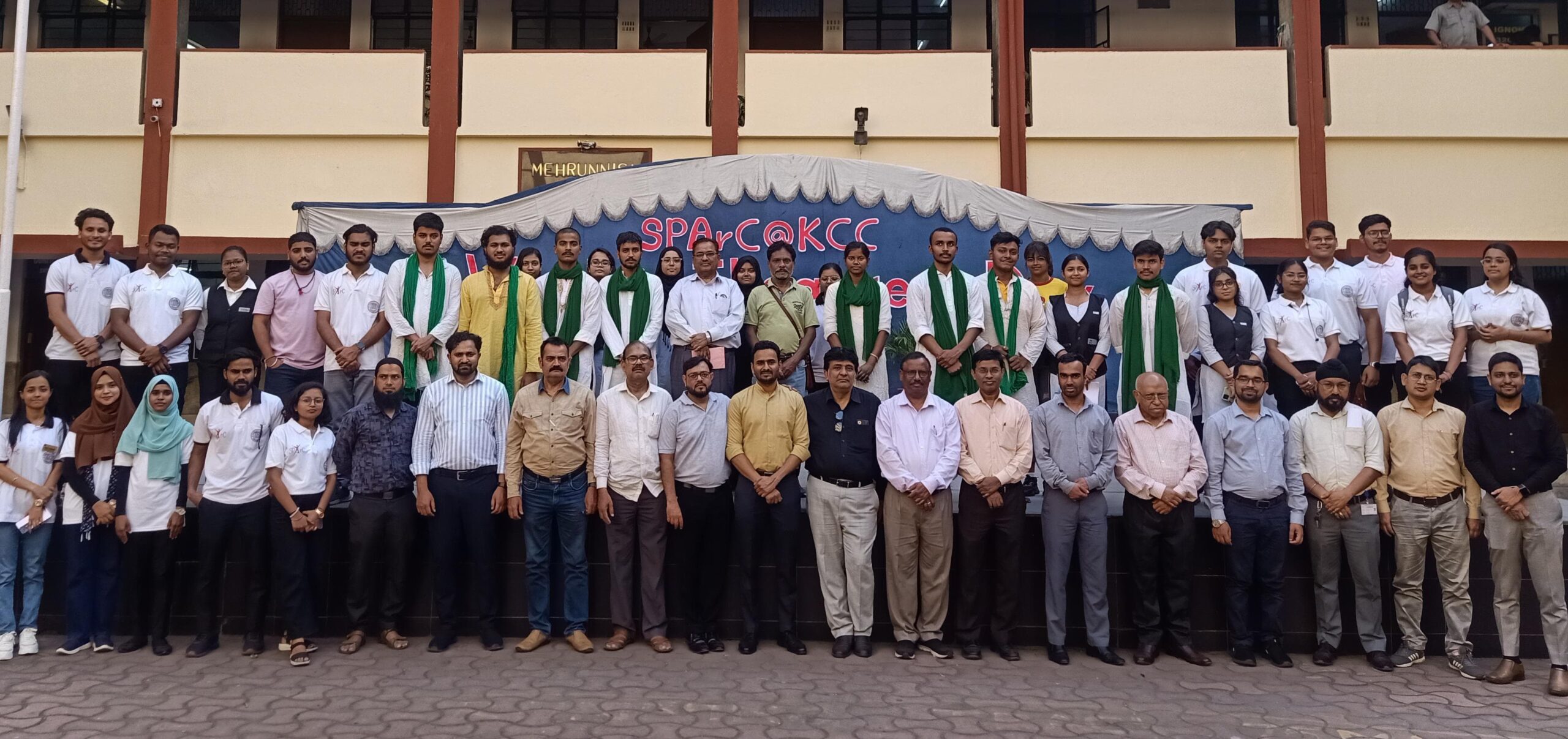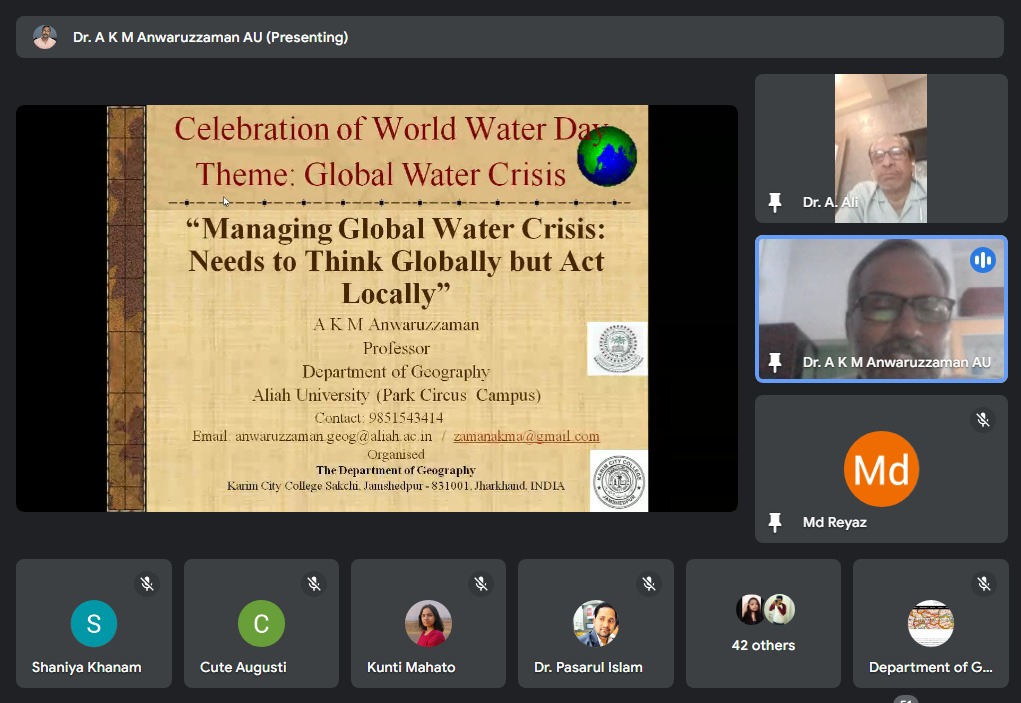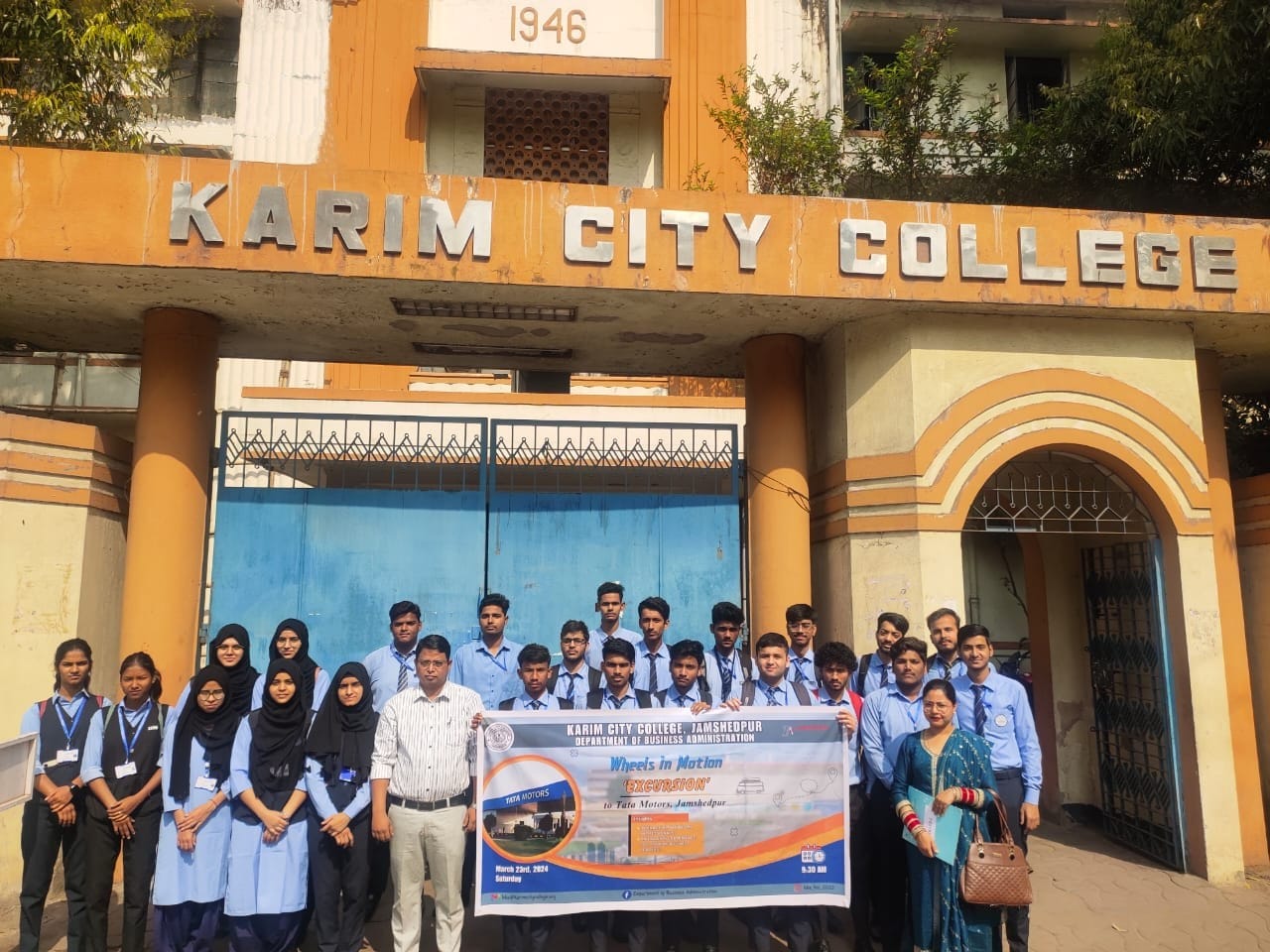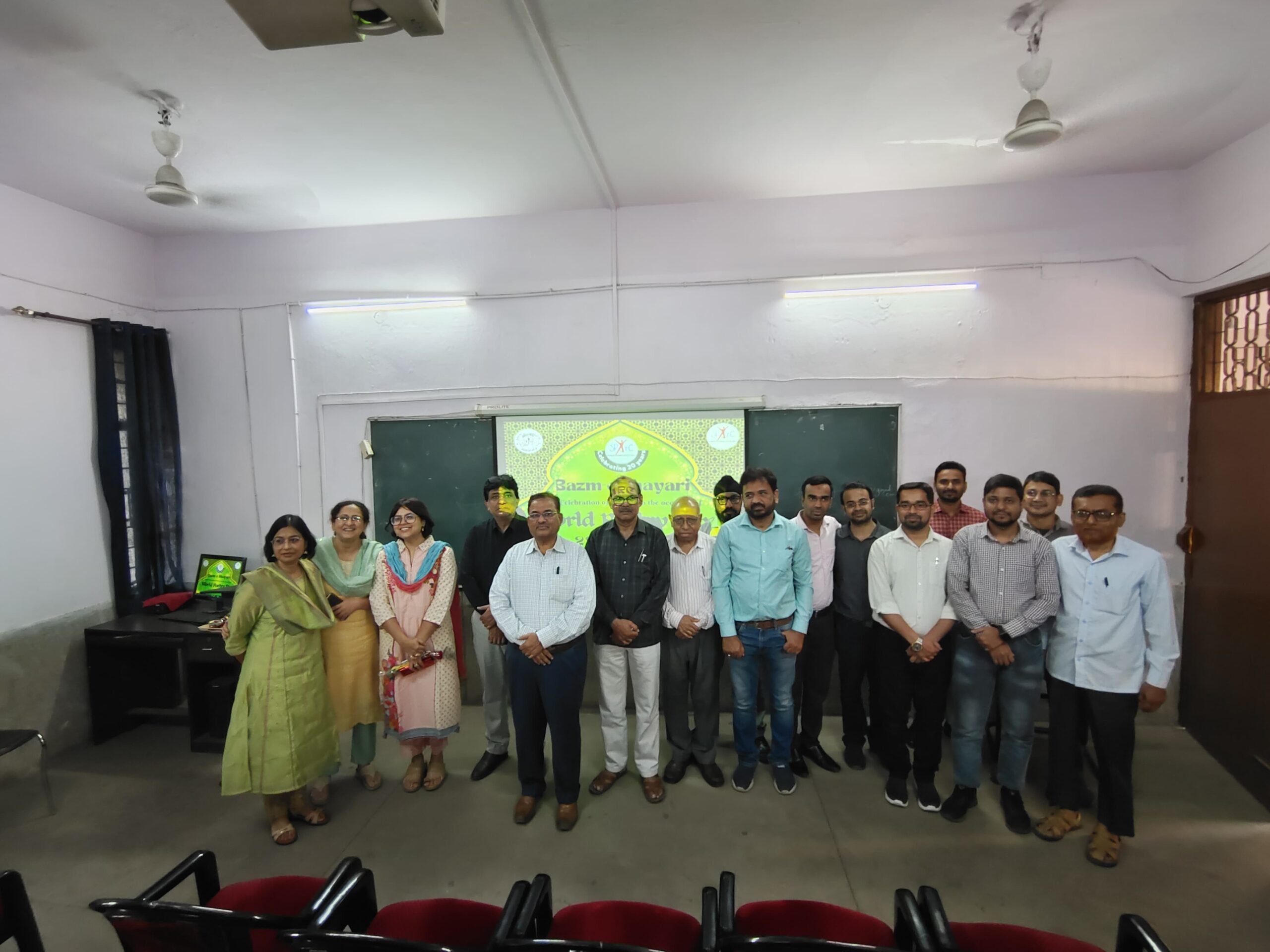THE INSTITUTION
Established in 1961 by our Founder Father Late Syed Tafazzul Karim with a view to impart education to the weaker section of Jamshedpur specially Muslims, Karim City College has now become a premier educational institution of eastern India.
After the sad demise of our founder his son Late S.M. Shafiq patronised the institution with his leading from the front attitude. His death in 1992 created a void which was successfully and graciously filled by our present trustee Mr. Syed Ashfaque Karim whose modern and progressive approach is taking the college to greater heights.
| ears | Events |
| 1961-62 | College starts with Pre University Courses |
| 1963 | Degree Courses were launched |
| 1964 | Demise of Founder Father S.T.Karim, S.M.Shafiq becomes Trustee of Karimia Trust |
| 1965 | Affiliation in Arts and Commerce (Degree) under Ranchi University |
| 1966 | Appointment of Prof.M.Yasin as Principal |
| 1978 | Establishment of Faculty of Science |
| 1981 | Attainment of 2F and 12B from UGC |
| 1989 | Appointment of Dr.Manzar Hussain Kazmi as Principal |
| 1992 | Death of S.M.Shafiq Syed Ashfaq Karim takes the charge of Trustee |
| 1992 | Foundation of new building |
| 1994 | Permanent affiliation of Commerce and Urdu |
| 1996 | Permanent affiliation of Science Subjects and remaining departments of Arts faculty |
| 1997-98 | Hons. in Mass Communication and Video Production |
| 2000 | Appointment of Prof. S.N.I.Hashmi as Principal |
| 2002-03 | Honours in Computer Application and Information Technology |
| 2003 | Capt. Dr.Md.Zakaria appointed as Principal |
| 2004 | Assessment of the College by NAAC Team, Bangalore |
| 2004 | Approval by UGC, New Delhi to teach Add-On Career Oriented Courses (Certificate / Diploma / Advance Diploma in 1.Industrial Chemistry, 2.Pollution Management, 3.e-Commerce, 4.Functional English, 5.Advertisement, Sales Promotion & Sales Mgmt., 6.Aqua Culture) |
| 2005 | Accreditation awarded B+ by NAAC |
| 2005 | Establishment of IQAC |
| 2005 | UGC selected the College as one of its Net Resource Centre |
| 2005 | Recognition granted by NCTE, Bhubaneshwar for teaching B.Ed. |
| 2006 | Establishment of Language Resource Centre |
| 2007 | Establishment of Lingua-Lab |
| 2008 | Establishment of Regional Field Unit of National Testing Service India, CIIL Mysore |
| 2008 | Establishment of Centre for Distance Education |
| 2010 | Permission for Honours teaching in Bangla and Philosophy from Kolhan University, Chaibasa |
| 2010 | College with Potential for Excellence (CPE) status by UGC |
| 2010 | INFLIBNET |
| 2010 | Permission for Honours teaching in English, Hindi and Geography from Kolhan University, Chaibasa |
| 2010 | Post Graduation in Mass Communication from Kolhan University, Chaibasa |
| 2011 | Establishment of Math Lab |
| 2011 | Establishment of MCA Lab |
| 2012 | Construction work of New Campus at Mango begins |
| 2012 | Accreditation awarded B by NAAC with CGPA 2.88 |
| 2012 | Establishment of E-Class Room |
| 2012 | Adoption of College Anthem |
| 2012 | International Mushaira |
| 2012 | Establishment of Rotract Club |
| 2012 | Virtual Library |
| 2012 | Geographical Observatory |
| 2013 | IGNOU Study Centre |
| 2013 | Post Graduation in Urdu and Mathematics |
| 2013 | Women’s Cell |
| 2013 | Mango Campus partially completed, B.Ed classes begin from Sep 2013 |
| 2014 | Started Off-Line Library and Portal |
| 2015 | Started M.A. in Psychology |
| 2015 | Started Master of Commerce |
| 2016 | Intermediate Section shifted to New Campus at Mango |
| 2016 | College selected for RUSA grants and Establishment of RUSA Cell |
| 2016 | Establishment of Study Centre of Maulana Azad National Urdu University (MANUU) Hyderabad for B.Ed Course under Distance Education Mode |
| 2017 | D.El.Ed Introduced at Mango Campus |
| 2017 | Launch of Management Information System (MIS) |
| 2018 | College Auditorium, Gymnasium and Student Activity Center |
| 2020 | P.G. in Chemistry |
| 2021 | Innovation & Incubation Centre |
| 2022 | P.G. in English |
| 2023 | Centre for Guidance & Counselling |
| 2023 | P.G. Diploma in Guidance & Counselling |
| 2023 | B.B.A. |
| 2023 | P.G. in Political Science |
Located in the heart of the city of Tatas, the College possesses a student friendly infrastructure, education centre activities and knowledge oriented ambience. Around 6,700 students are enrolled at present at UG and PG level pursuing their studies in five faculties and 22 departments. Run and managed by Karim’s Trust, Jamshedpur and permanently affiliated to Kolhan University, Chaibasa. Karim City College is known for its discipline, quality services and dedication. Under the empirical approach of our present trustee the College surged ahead in infrastructure facilities with the development of our new campus at Mango. Academic excellence is a pursuit for us and we are constant in our pilgrimage towards House Beautiful. The College had CPE status under 11th plan of UGC. It has been re accredited by NAAC in 2012.
We as an Institution focus on our students who provide us a reason for our existence. All our efforts are directed towards inculcating a constant yearning for learning.
Vision & Mission
Vision
Karim City College is a Muslim Minority Institution run and managed by Karim?s Trust, Jamshedpur, with permanent affiliation to Kolhan University, Chaibasa. Founded by Late Syed Tafazzul Karim, with the intention of promoting education among the weaker sections, particularly the Muslims, the college was established in 1961 with pre-university courses. Degree courses were launched in the year 1963. The institution achieved milestones with affiliation being acquired in 1965 for its degree courses of Arts and Commerce. It?s growth was accelerated by the establishment of its Faculty of Science in the year 1978. In the last fifteen years, after its first cycle of accreditation, the institution has witnessed a steady course of progress. In 2004 the college went for its first assessment by NAAC and was awarded a grade of B+. In the year 2010, the college was accorded CPE status by the UGC. The college went for its second cycle of accreditation in the year 2012 and was awarded Grade B with Grade Point 2.88. In the year 2013, the institution inaugurated a new campus at Mango to which its Faculty of Education was shifted. The college has zealously and consistently promoted extra-curricular activities. The college offers consistent encouragement to active social engagement and welfare activities. Discipline constitutes an important institutional concern. The institution focuses on character building through teaching and co-curricular activities. Today, the institution is proud to have its alumni disseminated across all parts of the country, rendering their services to society in various professional capacities.
Mission
Karim City College is the dream fulfilment of our visionary founder Late Syed Tafazzul Karim, who established the institution with Pre-University Courses in 1961 with a mission to impart quality education and to provide better opportunities of higher education to the weaker sections of the society particularly to the Muslim minority. Hence, all our efforts are targeted towards the attainment of this basic goal. The modern world and its challenges demand a constant renewal, a fresh approach and a process of change and adaption in the arena of higher education. The college is open to changes, innovations and improvisations. We are determined to acquire and provide the best in the field of higher education service towards self-fulfilment of our stakeholders in our constant goal. We are helping the students with the intention to enable them to help themselves. We are striving for the personal growth and leadership skills of our students empowering them to become responsible and cosmopolitan citizens. Building relationships, developing integrity and accountability, creating a sense of respect, service and fellow feeling and inculcating the rich cultural ethos of India ? all are our constant efforts towards the building of the nation and a safe society. We are constantly trying to create a modern, peaceful, progress oriented and knowledge based society with an emphasis upon research, innovation, production and not a sheer consumerist behavior. We are constantly trying to create a great sense of understanding among our students with regard to India?s plurality of religion and composite culture.
CORE VALUES
Karim City College is not simply a college but a community, a team, a community building organisation and nation building educational institution. Ours is a vibrant institution whose veins are full of the blood of service to the nation and whose heart is beating with the love of society. We, the students, the non-teaching staff, the faculty, the management and the governing body of Karim City College aspire to follow and practise the following core values in our words and deeds:
- Service to the nation.
- Service to the society.
- Service to the community.
- Service to the educationally weaker section of the society.
- Service to the down and out of the society.
- Respect to the heritage, diversity and integrity of the nation.
- Inculcation of scientific temper, culture and ethics.
- Inculcation of the love for Art, Literature & Culture.
- Inculcation of an urge for social service.
- Adherence to the principles of integrity, idealism, fairness, honesty & courage.
- Seeking self-improvement selflessness, self-discipline & self-respect.
- Nation Building through education.
- Empowering all stakeholders.
- Optimal Utilisation of resources.
- Collaborations Quality Sustenance & Improvement.
- Strengthening of faculty, staffs & students..
- Innovation, Creativity & Excellence.
- Listen, Care, Serve.
- Check out the egoes.
- Direct, Open and Frank communication creating space for communication.
- Team Building.
- Adherence to Professional Ethics.
- Safely, Security & Discipline for All.
- Compassion, Service, Hospitality.
- Learning for Life.
- Inclusiveness, Equality & Equity.
- Patience & Understanding.
- Openness to Change.
- Foster leadership and decision making.
- Engage the Alumni.
- Heighten the reputation of the college.
- Passion for the Welfare, well being and over all Wellness of the college.
CODE OF CONDUCT FOR MEMBERS OF THE GOVERNING BODY
- This code is intended as a guide to indicate the standards of conduct and accountability which are expected of members of the college Governing Body, to enable them to understand their legal and ethical duties and to assist them both in carrying out those duties and in their relationship with other members of the Governing Body and the Principal as well.
- The Members of the GB are recommended to familiarise themselves with the Bylaws of the college. They are also recommended to familiarise themselves with the rules and regulations of the UGC and the Parent University.
- By accepting the membership of the GB every member agrees to accept the provisions of this code as well as the Bylaws of the college.
- Each member also agrees that any breach of the code and the Bylaws may lead to the termination of their membership.
- The members are expected to promote the vision and mission, the purposes and aims and the values of the institution.
- The members of the GB are expected to recognise all these who are associated with or have dealings with the college including students, employees, suppliers, agents, other educational institutions and government departments.
- A highest ethical standard is expected from the members of the GB.
- The GB members owe a fiduciary duty to the college. This means that they should show highest loyalty to the institution and act in good faith in its best interest.
- The GB members are expected to act honestly, diligently and independently with out any fear or favour and bias or prejudice.
- The GB members are expected to promote and protect the good reputation of the college and the trust.
- Decisions taken by the members during the meetings of the GB must not be for any improper or personal motivate. Decisions taken must always be for the benefit of the institution, its students and staffs and the community.
- Members of the GB should have regard to the different but complementary responsibilities given to the principal as Chief Executive of the college.
- Members of the GB should refer to the Trustee Karim?s Trust? for advice related to governance and functioning of the institution.
- Members of the GB must not receive gifts, hospitality or benefits of any kind from any one. They are also expected to report in case of any offer of gift, hospitality or benefit.
- The GB is operated by its members taking majority resolutions during meetings. Each individual members has a duty to stand by it whether or not he/she was present at the meeting.
- Members of the GB may be consulted in person by the college authorities for running resolution if any situation may arise.
- Members of GB may also be expected to attend the meeting through video conferencing.
- In case of any disagreement the member has the duty to have the disagreement discussed in order to reach a proper solution.
- It is important that the members of the GB should have free and frank discussions in order to take the decisions collectively.
- To do so they must develop trust among themselves with a sense of shared responsibility.
- Members of the GB are expected to follow confidentially of matters and issues undertaken during a meeting.
- Members of the GB should not issue statements to the press of media including social media and networking or at any public gathering relating to the proceedings of the GB.
- It is unethical on part of the members of the GB to publicity criticise, canvass or reveal the views and opinions expressed during the proceedings of the GB.
- Members should ensure proper upkeep or disposal of papers/documents.
- The members should be aware about the systems in place to deal with the grievances of the employees and matters relating to their employment.
PRINCIPAL’S CODE OF CONDUCT
- Making proposals to the Governing Body about the educational character and mission of the institution, and for implementing the resolutions of the GB.
- The determination of the institutions academic and other activities.
- Preparing annual budgets, ensuring proper audit of accounts, supervising all financial operations and implementation of policies and plannings.
- The organisation, direction and management of the institution and providing leadership to staff.
- The appointment, assignment, grading, appraisal, suspension, dismissal and determination within the framework set by the Governing Body of the pay and conditions of service of staff.
- Maintaining law and order, student discipline and within the rules and procedures provided for within the Articles, Suspending or expelling students on disciplinary grands and expelling or suspending students for academic reasons.
CODE OF CONDUCT FOR TEACHERS
- This code of conduct by and by adheres to the UGC code of conduct for teachers. Hence teachers are requested to study the UGC?s COC at its website.
- Teachers should also make themselves aware about the norms, rules and regulations of the Parent University as well as the State Government.
- Whoever adopts teaching as a profession assumes the obligation to conduct himself/herself in accordance with ideals of the profession. A teacher is under constant scrutiny of his/her students, parents and the society at large. Hence, every teacher should ensure that there should be no incompatibility between his precepts and practice. The national ideals of education must be his/her own ideals and he/she should seek to inculcate it among students.
- The basic purpose of education is to create skill and knowledge and the awareness of our glorious national heritage and the achievement of human civilisation, possessing, a basic scientific outlook and commitment to the ideals of patriotism, democracy, secularism, socialism, peace and equality and the principles enunciated in our constitution.
- The teachers are expected to remain a constant practitioner of the above principles.
- Higher education has to produce leaders of society in all areas of manifold activities with a commitment to our national heritage and national ideals. Higher education should strive for academic excellence and the progress of arts and science. Education, research and extension should be conducted in confirmity with our national needs and priorities and ensure that our best talents make befitting contributions to international endeavour on societal needs.
- The teachers are expected to these ideals of higher education and the national and societal needs.
- The Management of the college expects an unconditional support from teachers in achieving the vision and mission of the college and work religiously in upgrading the teaching standard of the college.
- Keep loyal to the institution and its aim and objectives.
- The Teachers should engage classes assigned to them and submit the daily classes report to the respective Faculty Incharge before leaving the campus.
- The Teachers must ensure six hours stay in the campus.
- The Teachers must ensure the completion of prescribed syllabus before the commencement of university examination. The concerned Head of Department and Faculty Incharge well arrange extra classes for the completion of syllabus, if required.
- The Profession requires that the teachers should be clam, patient, communicative and amiable.
- The teachers should act or conduct themselves without any kind of fear of favour. They should keep themselves away from biases and prejudices.
- The teachers should manage their private affairs in a manner consistent with the dignity of the profession.
- The teachers should seek to make continuous growth through study and research.
- The teachers should express free and frank opinion by participation at meetings, seminars, conferences etc towards the contribution of knowledge.
- The teachers should maintain active participation in academic, administrative, co curricular, extra curricular and extension activities of the college.
- The teachers should perform their duties with regards to teaching, tutorial, practical, mentoring, seminar work and examination and evaluation conscientiously and with dedication.
- The teachers should assist in carrying out functions relating to the educational responsibilities of the college such as assisting in approaching applications for admission, advising and counseling students as well as assisting in the conduct of college and university examinations and other academic or administrative functions.
- The teachers should respect the right and dignity of the students.
- The teachers should create space and opportunity for students to express themselves freely.
- The teachers should deal justly and impartially with students regardless of their religion, caste, colour, creed, sex, gender, race, ethnicity, cultural/social/economic background, political/ideological affiliations etc.
- The teachers should recognize the difference in aptitude and capabilities among students and strive to meet their individual academic needs.
- The teachers should encourage students to improve their attainments, develop their personalities and contribute to community welfare.
- The teachers should inculcate among students a scientific outlook, respect for physical labour and the ideals of democracy, patriotism, peace and communal harmony.
- The teachers should inculcate culture, ethos and ethics and create love for creating, literature, art and culture.
- The teachers should be affectionate to students and not behave in a vindictive manner towards them.
- The teachers should pay attention to only the assessment of merit.
- The teachers should make themselves available to the students even beyond the class hours and help and guide students without any remuneration or reward.
- The teachers should behave as an ambassador of the college.
- The teachers should abide by the rules and regulations of the UGC, the Parent University and the State Government.
- The teachers should abide the bylaws of College Governing Body.
- The teachers should be positive towards the attainment of the policies, plans, vision and mission of the college.
- The teachers should be fair, honest, impartial and considerate in his/her dealings with the non-teaching staff of the college.
- The teachers should cooperate in creating a disciplined, clam and clean environment inside the campus.
- The teachers should not organise any meeting or should not invite anyone without prior information and permission from the principal.
- The teachers should not organise any function or programme without prior information and permission of the principal.
- The teachers should not organise any fund raising drive without permission of the principal.
- The teacher should stay away from any kind of showoff that may create a sense of inferiority among co-workers or students.
- The teachers should stay away from the use of mobile phone inside the classroom. In this regard they are advised to follow the etiquettes of using mobile phones.
- The teachers should respect the rights of individual including his/her freedom of speech provided it is within the law.
- The teachers should develop a caring and welfare approach.
- The teachers should ensure their participation in research, seminars and conferences, workshops. They should also aware publication of books and research papers.
- The teachers should provide documented information of their achievements to offices concerned.
- KCC is a community and as a major stakeholder of this community the teachers are expected to adhere to its rule and regulations, to show commitment towards the institution, to show consideration, respect and regard to persons engaged with the institution, to show concern for its well being and to behave in a way that may not interfere with the functioning of the college. Where there is reason to believe that rules are violated, norms have been breached and values have been compromised the disciplinary code and procedure will be instigated by the college management.
CODE OF CONDUCT FOR NON-TEACHING STAFF
- Obey the Bylaws of college Governing Body.
- Obey the rules and regulations of UGC, Parent University and the State Government.
- Maintain honestly, integrity and fairness in your dealings.
- Keep loyal to the institution and its aim and objectives.
- Maintain Total Quality Management (TQM).
- Respect the Teachers, Students and your fellow colleagues.
- No meetings, fund raising, no invitation to guest.
- Must not divulge the official secret.
- Must no mutilate, expunge, conceal, alter or forge official documents/receipts/computer files & folders.
- Must not intercept or misappropriate the fund.
- Do not engage in any malpractices.
- Do not involve in dubious transactions.
- Respect hierarchy of Administration and Academics.
- A strictly follow the timings.
- Dress decently and appropriately.
- Must not use official time for private or personal purposes.
- Do not do any one’s personal work.
- Must not use unauthorised persons to perform any work.
- Follow self Discipline & Restrain.
- Deal politely with teachers, staff, student, parents & general public.
- Must not be absent from duty without prior information/permission.
- Respect the image of the college and work to increase its reputation.
- Be careful in online dealings/associations/friendships/interactions with current students via social media.
- Do not discriminate anybody on any basis.
- Take care of safety, security and personal hygiene.
- Do not issue statements if you are not authorised for it.
- Protect all data, digital or manual.
- Maintain highest standard of professional behaviour.
- Work with the intention of serving the people.
- Work towards continuous professional development.
- Avoid words or deeds that may bring the college into disrepute.
- Do not undermine staff/students/parents/general public.
- Respect the vision & mission, policies core values of the college.
- Respect and safeguard the property.
- Cooperate and coordinate with staffs.
- Be communicative but do not be outspoken.
- Respect the rights and opinions of other.
- Do not involve in any kind of offences against students.
- Do not neglect your duties.
- Do not refuse any work instructed by the authorities concerned.
- Do not use intoxicants, cigarettes, pan masala, tobacco or gutkha during duties hours.
- Any breach of conduct and violation of values may lead to proper and stringent action by the GB/Principal/Competent authorities.
STUDENT CODE OF CONDUCT
- As the citizen of India the students should respect the legacy, heritage and culture of the nation. They should make themselves aware about the glorious national heritage and show commitment to the ideals of nationalism, democracy, secularism, socialism, peace, equality and harmony. They should work towards national integration and people?s welfare.
- The Students should be committed to the ideals of higher education and inculcate scientific temper and love for the rich art, culture & literature of the country.
- Realise that you are an ambassador for Karim City College and remember that you are carrying its name and repute wherever you go.
- Your behaviour counts as our ambassador not only in the campus but outside. Behave well with teaching staff, our non-teaching staff and your fellow students. Behave well with the local populace and while you are away from the college. Behave well during your field visits, surveys, internship etc.
- Recognise the diversity of the college community, do not discriminate on the basis of religion, region, caste, community, colour, creed, ethnicity, race, culture, language, political or social opinions, social status, illness, disability, sex, gender, gender identity, sexuality, sexual orientation, mental or physical health status.
- Throw the litter in the dustbins or at the assigned places.
- Cooperate with the cleaning staffs, security staffs and guards.
- Cooperate with us in saving energy.
- Do not shout and, do not talk loudly in the campus.
- Follow the norms of using mobile phones.
- Show good sportsman spirit and participative compassion when you are participating in any event or function.
- Refrain from showing off your superiority in terms of your abilities, dresses etc.
- Refrain from using social media inside the campus. Respect the rights of the individual including his/her freedom of speech provided it is within the law.
- Develop a caring and welfare approach
- Keep yourself aware about your academic activity, examination dates, dates of registration, dates for form fill up and issue of hall ticket (Admit Card), literary and cultural activities, sports activities, extension activities.
- Keep yourself informed about the facilities that the college provides to you. Keep yourself aware about the student support facilities.
- Keep your college related documents and informations intact.
- Show respect to the college property, it is yours.
- Keep yourself informed about timings and schedules and the changes in the same.
- Play your part in maintaining security, peace and clam in the campus.
- Produce your I-card as and when asked for.
- Show utmost care to the college environment by respecting buildings, spaces and facilities economic background etc.
- Act responsibility, being honest, being consideration, being respectful and being courteous towards others. Behaving in a respectful? manner towards others so that they do not feel that they are being bullied or harassed.
- Follow the rules laid down by the college library, reading rooms, canteen, common rooms, offices and other related organs of the college.
- Read the rules regulations section of the prospectus carefully.
- Keep visiting the website of the college.
- Maintain a harmonious atmosphere in the campus and ensure peaceful environment.
- Do not loiter around or congregate near the classrooms and in the corridors.
- Do not stand in front of or near a classroom when a teacher is engaging the class.
- Adhere to the 75% minimum attendance norms failing which students will not be allowed to appear in the university examination.
- The Heads and other teachers of the departments concerned are authorized to take justified action against irregular and undisciplined students.
- The In-charges of different faculties, Discipline Committee, Anti Ragging Cell, Grievance Redressal Cell and Women?s Cell are authorized to keep strict vigil in the campus.
- No Society, association, union or club can be formed in the name of the college without permission of the principal.
- No meeting shall be convened and no person shall be invited to address any meeting or gathering without permission of the principal.
- Students should not participate in any political or religious activities in the college campus or outside in the name of the college.
- Students should not collect money or raise fund inside or outside the campus in the name of the college.
- Use of any intoxicant, tobacco, cigarette, gutkha or paan masala is strictly prohibited.
- Students must bring their parents when asked for either by the college administration or by the HOD for parent-teacher meeting.
- Students should follow the prescribed dress code of the college.
- Students should follow the etiquettes of using cell phones as defined by the college
- Be punctual and regular in your classes.
- Be punctual if you have any fixed appointments either with teachers or administrative staff.
- Inform the person concerned if you are going to be absent or delayed for an activity which you are expected to attend.
- KCC is a community and as members of this community the students are expected to adhere to KCCs rules and regulations, to show respects for persons and property and to behave in a way that does not interfere with the normal operations and functioning of the college. Where there is a reason to believe that rules and regulations have been broken, norms have been breached and/or when the behaviour of a student falls below the expected standards the Disciplinary Code and Procedure will be instigated by the proper authorities.
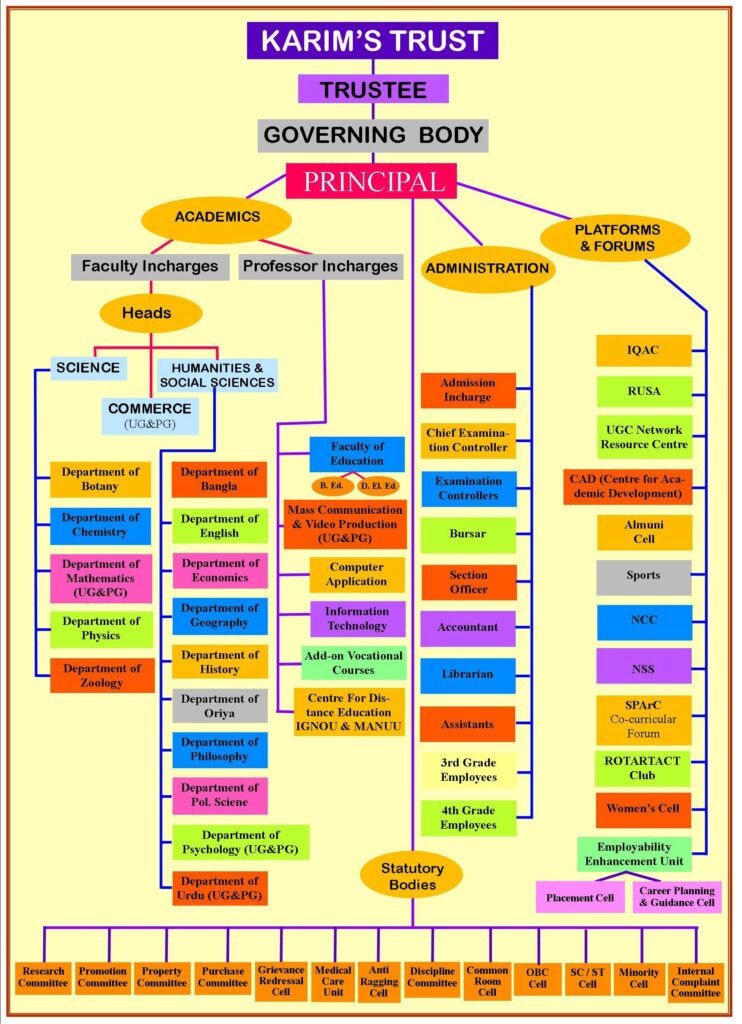
20 YEAR PERSPECTIVE PLAN & ITS DEPLOYMENT
With Effect From 2015-16
Proposed Relocation of the College
In the light of the forthcoming expansion plan of Tata Steel many buildings, organisations and educational institutions in the close vicinity of Tata Steel are facing a relocation. In such case it is pertinent on the part of the college to gear itself for the shifting. The parent body of the college i.e. Karim’s Trust Jamshedpur is taking up the task of negotiating with the concerned authorities viz the State Government (through The District administration) and Tata Steel for suitable and sufficient allocation of land and its required paraphernalia. Once this is finalised the college authorities will take up the task of shifting in a planned and phased manner.
The college management hopes to get a good quality of land after the successful completion of talks in relation to proposed shifting. In that case the college authorities plan to create separate blocks for academic and administrative purposes, a state-of-the-art library premises with more space for reading room, virtual library and net surfing centre, an auditorium to accommodate 1000 seats, a separate student activity centre, play grounds and sufficient parking spaces.
AUTONOMY, DEEMED TO BE A UNIVERSITY STATUS AND FINALLY A STATE MINORITY UNIVERSITY
The status of an autonomous college is going to be a cherished goal of our parent body i.e. Karim’s Trust Jamshedpur, our college Governing Body and all the people associated with the college. A Steering Committee under the Internal Quality Assurance Cell of the college will look after the achievement of this goal.
Once this is achieved the deemed to be university status and finally a state minority university status will be our next target which the college authorities would like to achieve well in time. This journey towards the status of a government aided minority university will be a dream fulfillment for us and will be a boon for educationally backward classes especially the Muslim minority.
To achieve the targets of autonomy, a deemed to be a university and then of a minority university, the parent trust and the Governing Body of the present college have to take up a plethora of plannings and initiatives related to the acquisition of land, generation of resources, construction of buildings including hostel, creation of new departments, introduction of new courses, sanctioning of new posts by the state government, appointment of teaching and non-teaching staff etc. Once the status of minority university is achieved following will be some among many of the tasks which the management will take up in a phased manner and with the help of available human and strategic resources.
- Acquisition of Land
- Construction of Separate Faculties and Vocational Education Centre
- Hostels, Play Grounds, Indoor Stadium, Gym and Student Activity Centre
- Auditorium & Separate Multipurpose Halls
- Green House & Botanical Garden
- Health Centre & Day Care Centre
- Non-conventional Energy Resources, Rain Water Harvesting, Green Landscaping
- Separate Multi Storied Library & its Archive
- Small Printing Press
- Journals and Magazines
- Own FM Radio
- Guest House & Canteen
- Staff Quarters
- Multi-storied Parking Facility
- Researches & Patents
- MOUs & Strategic Partnerships
- New Academic Programmes
- Establishment of Schools of Law, Medicine, Engineering etc.
- Establishment of its Study Centres in such areas where the mission of empowering the educationally weaker sections can be addressed
- Community Services
Upcoming Events
- There are no upcoming events.

